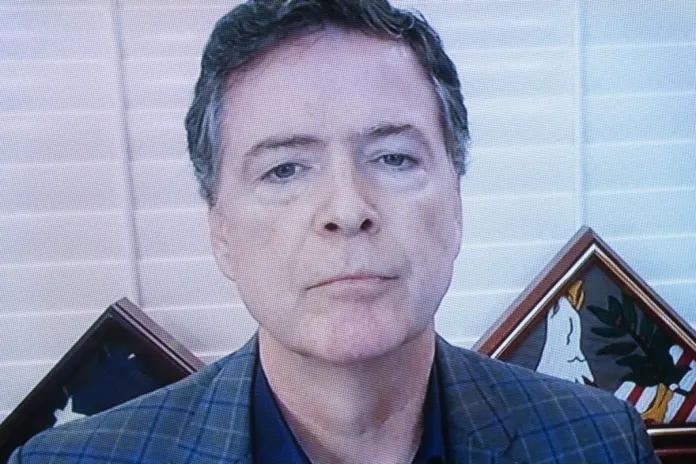A federal magistrate judge ordered the Justice Department to hand over all grand jury materials to former FBI Director James Comey on Monday, saying the record shows unusually strong reasons to suspect irregularities in the proceedings.
U.S. Magistrate Judge William Fitzpatrick, who is handling pretrial discovery disputes in the Comey case, said Comey’s team presented “a rare example of a criminal defendant who can actually make a ‘particularized and factually based’ showing” that problems that occurred during the grand jury proceedings may justify dismissing counts of the indictment, ordering the government to release audio tapes from the proceedings by 5 p.m. local time.

“The Court recognizes that the relief sought by the defense is rarely granted,” Fitzpatrick wrote in an order published to the court docket Monday morning. “However, the record points to a disturbing pattern of profound investigative missteps, missteps that led an FBI agent and a prosecutor to potentially undermine the integrity of the grand jury proceeding.”
Fitzpatrick expressed concern that Halligan’s presentation relied entirely on the testimony of a single FBI agent who may have reviewed material subject to Comey’s attorney-client privilege with longtime associate Daniel Richman, a Columbia Law School professor who doubled as an adviser to Comey when he was director of the FBI. The agent was made aware that he may have inadvertently reviewed the material improperly, Fitzpatrick said, but still “proceeded into the grand jury undeterred and testified in support of the pending indictment.”
The magistrate judge ruled that Comey’s due-process rights outweigh traditional grand jury secrecy and ordered prosecutors to turn over the full set of materials by the end of Monday. The opinion also cited possible Fourth Amendment violations, exposure to privileged communications, and irregularities during the grand jury presentation.
Comey has pleaded not guilty to charges of obstruction and making false statements related to his 2020 congressional testimony, with a trial set for Jan. 5, 2026.
Shortly after Fitzpatrick’s order, Assistant U.S. Attorney Gabriel Diaz filed an emergency motion seeking to delay the release of grand jury records and asking for additional time to file an objection to their release by Nov. 24. Notably, the prosecution argued that the magistrate judge considered “premature issues” that “have not even been briefed” by both parties, suggesting Fitzpatrick overstepped in his assessment that there were possible grand jury missteps.
“Indeed, the government believes the Magistrate Judge may have misinterpreted some facts he found when issuing the latest order to release the grand jury materials to the defendant,” Diaz wrote. “For instance, whether the defendant has any standing to challenge the Richman materials, the full context of the statements made by the prosecutor to the grand jury, that Agent-3 was exposed to potentially privileged material, and that two indictments were presented to the grand jury.”
Fitzpatrick’s order comes as a separate challenge threatens the validity of the indictment itself. At a hearing last week, U.S. District Judge Cameron Currie questioned the legality of interim U.S. Attorney Lindsey Halligan’s rushed appointment and the circumstances under which she secured indictments against Comey and New York Attorney General Letitia James. Currie, a senior judge from South Carolina, was tapped to preside over the defendants’ removal request in an effort to avoid a conflict of interest.

Attorneys for both defendants argue that Halligan’s appointment violated the Constitution’s appointments clause and allowed a politically connected interim prosecutor with no prior prosecutorial experience to override career staff who warned that the evidence was unlikely to persuade a jury.
Currie’s skepticism deepened after learning that a portion of Halligan’s grand jury presentation, between 4:28 p.m. and the return of the indictment just after 6:30 on Sept. 25, was never transcribed, casting doubt on later assurances by Attorney General Pam Bondi that she had reviewed Halligan’s full grand jury appearances before retroactively approving her actions.
“How does the AG say she has reviewed [the materials] when they didn’t exist?” Currie asked.
DOJ URGES JUDGE NOT TO TOSS COMEY AND JAMES CASES OVER ‘PAPERWORK ERROR’
Government lawyers have urged the court to treat the issues as clerical errors and preserve the indictments even if Halligan is disqualified. Both Comey and James are asking for dismissal with prejudice, arguing that the cases were rushed through by an unlawfully appointed prosecutor over internal objections.
Currie has said she expects to rule before Thanksgiving on whether to disqualify Halligan. On Wednesday, a separate hearing is set before Judge Michael Nachmanoff, Comey’s trial court judge, on the former FBI director’s claim that the prosecution is “selective and vindictive.”
